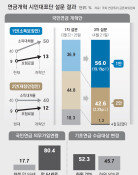FTAs, momentum enhancing competitive edge
FTAs, momentum enhancing competitive edge
Posted March. 11, 2014 08:01,
The Korea-Chile Free Trade Agreement will mark the 10th anniversary next month. It was claimed that if Chilean grape is imported, all grape farms will go out of business, but they saw their income double. It is because Korean farmers have grown quality products including kyoho grape and green grape, and successfully competed with imports. Farmers, who removed all of their grape trees and planted other crops due to the prediction that all grape farms would collapse, only ended up wasting up state compensations for their liquidation. Argument by militant farmers organizations, which forecast that damage in the agricultural sector alone after the effectuation of the FTA would exceed 2 trillion won (1.88 billion U.S. dollars), has proven to be groundless.
The government should provide assistance to sectors that are expected to incur damage due to FTA. It is problematic, however, to provide compensation to farmers who preemptively cut off their peach trees even though not a single peach was imported. Due to ill-advised prediction, a total of 240 billion won (225 million dollars) in compensation for liquidation went up in smoke. All the previous governments spent hundreds of billions of dollars at the pretext of preparation for the Uruguay Round trade negotiations and relief for damage due to the Asian financial crisis, and follow-up measures for the Korea-U.S. Free Trade Agreement. During the latest foot-and-mouth disease outbreak, critics would question whether the state must pay compensation with taxpayers money to farms, whose owners went to a Southeast Asian country for tour only to bring in the disease.
Of the 13.5 trillion won (12.7 billion dollars) in the Food, Agriculture and Forestry Ministrys budget for this year, 5 trillion won (4.69 billion dollars) is earmarked for subsidies for modernization of facilities, provision of tax-free farming oil, and rice farming subsidy. Farmers who move fast can cleverly pocket a significant portion of agricultural subsidies. Certain critics use coffee shop farmers to refer to those who meet with government officials at coffee shops, instead of working at the farm, and receive farming subsidies. Instead of resorting to populist policy seeking to compensate farmers by saying Agriculture will collapse whenever an FTA is mentioned, the political circle should assist reinforcement of agricultural competitiveness through legal and institutional measures.
Korea has forged 11 free trade agreements, including the Korea-Australia FTA that was concluded late last year. Korea is also poised to embrace massive market opening, including the Trans-Pacific Partnership led by the U.S., and the Regional Comprehensive Economic Pact spearheaded by China. The Korea-Australia FTA is set to take effect in 2015, while negotiations are underway to forge a Korea-New Zealand FTA, and Korea-China FTA. These are all countries with a competitive farming sector. We now live in an era when the value of farming and livestock products is determined not only by price but also by competitiveness in quality and service, including safety, freshness, and brand awareness. If Korea can differentiate itself in terms of quality and service, there are a number of agro and livestock products that Korea can afford to sell to China throughout the year. FTAs should be used as opportunities to elevate Koreas agricultural competitiveness by one notch.







